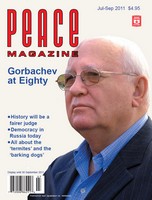
Peace Magazine Jul-Sep 2011, page 31. Some rights reserved.
Search for other articles by peacemag here
Senator Douglas Roche is now a nominee for the Nobel Peace Prize for his work toward the abolition of nuclear weapons. Making good use of this opportunity, in late May he set off on a world tour.
He has been meeting government officials and speaking publicly to promote a nuclear weapons convention in Beijing, New Delhi, Moscow, Stockholm, Oslo, Berlin, Brussels, and London. After returning home to Edmonton in mid-June he will proceed to Washington and the UN for further discussions about this urgent issue.
For the 13th year, about 8,000 arms dealers in the Canadian Association of Defence and Security Industries (CANSEC) held a trade show in Ottawa June 1-2.
Over 100 peace activists from Ottawa, Montreal, and Toronto met the Coalition to Oppose the Arms Trade (COAT) to oppose this event. Though barred from entering the park, the activists confronted those arriving, asking them to sign a commitment to adhere to the Nuremberg Principles. (No one signed.) The peace activists also decorated the 8-foot steel fence with posters of war and inspirational pieces by Gandhi, Eisenhower, and others.
The Raging Grannies sang, and the speakers included retired MP David Kilgour, Steven Staples, and Elizabeth May, who stated that she could not get inside the CANSEC gates with her MP status. Nor could the other activists get in, so they staged a “die-in,” lying down in front of the gate. The authorities remained friendly and arrested no one. Next year there will be another arms bazaar and another demonstration against it.
Source: Koozma Tarasoff, kjtarasoff@gmail.com
Global military expenditures reached a staggering $1.6 trillion in 2011. To call attention to this ghastly fact, the International Peace Bureau and the Institute for Policy Studies co-sponsored on April 12, 2011 a “Global Day of Action on Military Spending.”
All around the world affiliated peace groups held public events. In Canada actions took place in Halifax, Montreal, and Toronto. Science for Peace sponsored the Toronto event—a public forum at University of Toronto with panelists Bill Robinson and John Siebert speaking on Canada’s military expenditures, and with Sergei Plekhanov recounting the recent history of global spending.
In most other cities the actions were in the streets. For example, in Eugene, Oregon the activists gave passersby 10 pennies and asked them to distribute them among various jars in the same proportions that they would like their federal tax dollars to be spent. The outcome demonstrated that the taxpayers were not interested in supporting the war in Afghanistan, but wanted their money to go for projects of greater social value.
Source: demilitarize.org
A three-day peace education “summit” met in Newark, New Jersey from May 13-15, hosted jointly by Tibetan Buddhists and the city of Newark. There were approximately 100 speakers, many of them very prominent, such as the Dalai Lama and two female Nobel Peace Laureates, Shirin Ebadi and Jody Williams. For a full report on this event, find it on our website at http://peacemagazine.org/v27n0p02.htm.
The Conservative government is planning to buy 65 new joint strike fighters, at a price that they estimate as $75 million each.
However, Mike Sullivan, an official with the US General Accounting Office, gave a significantly higher estimate to Evan Solomon on CBC: “Probably between $110 and $115 million.”
Source: http://bit.ly/pQzLRy.
It is generally known that democracy flourishes only where civil society is strong. However, some sociologists worry that new systems of communication may be diverting our attention away from real relationships, including participation in NGOs, and even close personal friendships. To test this theory, the Pew Research Center conducted a survey to compare users and non-users of the internet and social networking sites such as Facebook. Their report, “Social Networking Sites and Our Lives,” was released on June 16, 2011, can reassure us all. Some 79% of American adults now use the internet, and nearly half of adults (47%) also use at least one social networking site (SNS)—primarily Facebook.
Because “demographic” factors such as age, sex, and education differ between users and non-users, the researchers controlled for these factors. Even so, they found that Facebook users are especially trusting, have more close personal relationships, and are more politically engaged than non-users. SNS use is increasing dramatically, and so are real friendships.

Peace Magazine Jul-Sep 2011, page 31. Some rights reserved.
Search for other articles by peacemag here